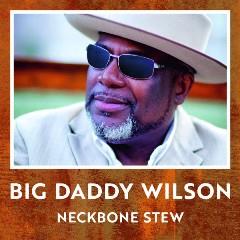Big Daddy Wilson – Neckbone Stew (2017)
Big Daddy Wilson – Neckbone Stew (2017)

1 Cross Creek Road 2 7 Years 3 Neckbone Stew 4 I Just Need A Smile 5 Tom Cat 6 He'll Make A Way 7 Give Me One Reason 8 Running Shoes 9 My Babe 10 Damn If I Do 11 Cookies Gonna Kill Me 12 The River + 13 Peanut Butter Pic Lead Vocals – Big Daddy Wilson Backing Vocals – Paris Renita (tracks: 6) Bass, Double Bass [Upright], Backing Vocals – Paolo Legramandi Drums – Nik Taccori (tracks: 2) Guitars, Drums, Percussion, Keyboards, Backing Vocals – Cesare Nolli Flute – Alessandro Meroli (tracks: Alessandro "Merols" Meroli) Drums, Bass – Staffan Astner (tracks: 11) Electric Guitar, Acoustic Guitar – Staffan Astner (tracks: 6, 11) Guitar – Eric Bibb (tracks: 6, 11) Lead Vocals – Ruthie Foster (tracks: 7) Horns – Alessandro "Merols" Meroli Keyboards – Davide "Dave" Rossi (tracks: 2, 4, 5, 7, 8, 12) Percussion – Big Daddy Wilson (tracks: 13) Tuba – Sven Lindvall (tracks: 11)
Singer-songwriter Big Daddy Wilson has a fascinating back-story, from being born and raised in the small town of Edenton, North Carolina, to joining the US military and serving in Germany, where he met his future wife and first heard the blues. He fell in love with both and, after leaving the military, settled in Germany, following that grand tradition of many US blues artists who found more success in Europe than at home. Think of Wilson as the latest to follow the path laid down by Champion Jack Dupree, Eddie Boyd, Louisiana Red and Memphis Slim – or even Luther Allison and Eric Bibb before they achieved success in the US.
Neckbone Stew is Wilson’s first album on Germany’s Ruf Records and the album title is a fair reflection of its contents – Wilson has thrown a lot of different ingredients into this record. There is traditional country blues, soul, pop, reggae, modern electric blues, gospel and funk, but what could have resulted in an unfocused, stodgy mess has actually produced a gumbo of exquisite taste and one to which you will find yourself returning regularly.
The title track is a good example, starting in a country blues style with Wilson’s warm, husky vocals backed only by Cesare Nolli’s heartfelt slide guitar, before the band kicks in after the first verse moving the track squarely into reggae territory.
On the other hand, “Running Shoes” has an infectious drone-like quality that sounds like what might happen if the Alan Parsons Project was populated with blues musicians; “My Babe” is an acoustic ballad that evolves into a reggae evocation of love; while “Damn If I Do” is a whip-smart funk work-out.
Wilson’s primary band comprises Paolo Legramandi on bass and backing vocals and Cesare Nolli on guitar, drums, percussion, keyboards and backing vocals. As with the musical genres he essays, however, Wilson is also happy throwing in a number of guest musicians in the confident expectation that they will enhance the music rather than diminish it. As a result, Eric Bibb and Staffan Astner add guitars to the gentle gospel shuffle of “He’ll Make A Way” and the comedy acoustic blues of “Cookies Gonna Kill Me” (a close cousin to Lonnie Mack’s classic “Oreo Cookie Blues”), which also includes Sven Lindvall’s honking tuba. Nik Taccori contributes drums to “7 Years”, Alessandro “Merols” Meroli adds horns and flute to a couple of tracks, Davide “Dave” Rossi adds keyboards to about half the album and the always-wonderful Ruthie Foster lends her golden voice to a terrific re-working of Tracy Chapman’s “Give Me One Reason”.
“Give Me One Reason” is the only cover on Neckbone Stew. Wilson either wrote all the other songs himself or co-wrote them with one or more of Nolli, Legramandi or Bibb.
Acoustic instruments are given at least equal treatment to electric instruments throughout Neckbone Stew. The album is book-ended by “Cross Creek Road”, which features Wilson alone with Nolli’s acoustic guitar on a traditional-style country blues, recalling the vitality and muscular power of early Alvin Youngblood Hart, while the closing “bonus” track, “Peanut Butter Pic” is a hilariously upbeat story about a chance encounter Wilson had with a peanut butter entrepreneur in New Zealand.
Neckbone Stew is a seriously impressive release, with well-constructed songs, powerful performances and cracking sound quality. This isn’t an album of funk or soul with some blues influences. Rather, it is a full-bore blues album with hints of everything else. With his warm, powerful voice, smart songs and willingness to stretch the boundaries of the blues, Wilson at times recalls the likes of Taj Mahal or Keb’ Mo’. High praise indeed. This is wonderful stuff. ---Rhys Williams, bluesblastmagazine.com
download (mp3 @320 kbs):
